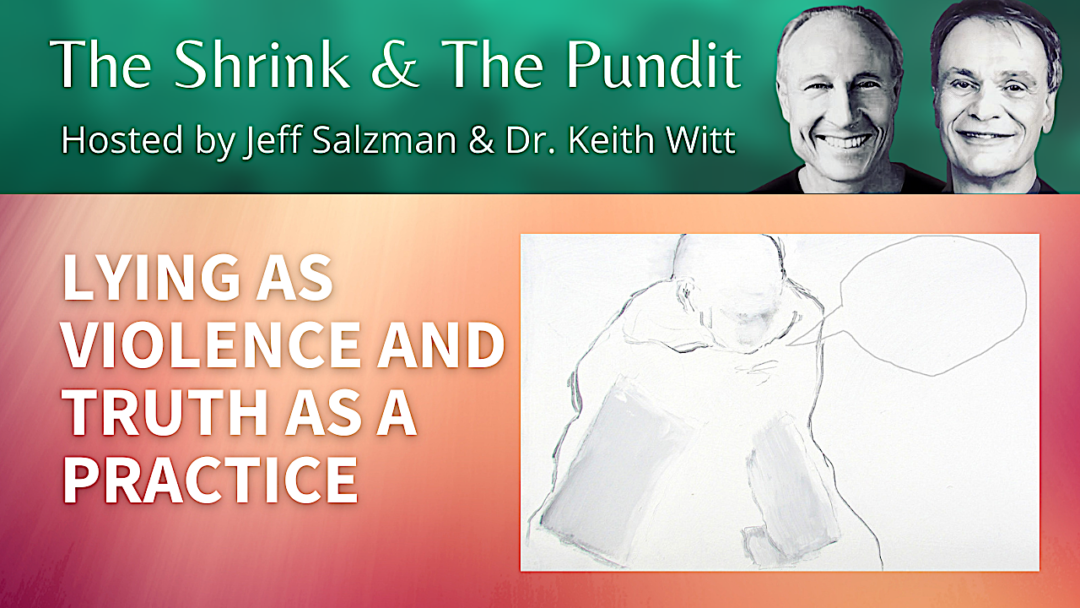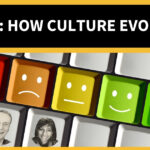Before you speak,
Let your words pass through three gates.
At the first gate ask yourself “is it true?”
At the second ask “is it necessary?”
At the third ask “is it kind?”
-Sufi sayingYou’re only as sick as your secrets. -AA axiom
The ability to lie is actually a developmental milestone. At sixteen months a child can hide an emotional state, and around age three she can lie outright. By age six we’re all lying a couple of times a day.
Research shows that college students lie in fifty percent of conversations they have with their mothers, and people who are dating lie thirty percent of the time in their interactions with each other.
The ultimate irony is that the person you’re most likely to lie to is the person you’re most intimate with.
“The culture normalizes different lies and levels of lies with different worldviews. We expect certain groups to tell specific kinds of lies and others not to,” says Dr. Keith. There are lower left quadrant standards at all stages, and those standards tell us what is acceptable as a lie and what isn’t.
Blue, or traditional, can embrace a lie if they think the motive is virtuous (“We are not hiding any Jews here”), orange if it’s legal or even profitable (all advertising, basically) and at green, if someone is not being cared for in a way that I can idealistically imagine them being care for, then I can justify lying.
Jeff points out that with politics we actually expect people to lie openly and consistently — we’ve normalized it, culturally, for an entire profession.
Indeed, lies are a form of discourse. Twenty-five percent of lies are told purely for the benefit of the person being lied to, says Dr. Keith.
“Almost all psychotherapy is concerning where people lie to themselves about themselves. Super anxious people are lying to themselves about how dangerous the world is. Super depressed people are lying to themselves about the possibilities of having a joyful life.” ~Dr. Keith Witt
There are lies of commission and lies of omission, conscious lies and unconscious lies. For instance, for some couples it’s against the (unspoken) rules to be mad at each other, or to be critical, so they lie about what they’re feeling or about what they really think. To be congruent they have to lie to themselves about it too, and voilá, an unconscious lie. Dr. Keith experiences this regularly in his practice.
There are even endogenous lies that were put into our psyches at an early age, which we may still believe, even in the presence of evidence to the contrary. Do you see why a skilled psychotherapist might be important?
Dr. Keith tells Jeff that if all psychotherapy were just focusing on what was a distortion or a lie, and what was compassionate truth, that function alone would make it useful and good.
Lying is a subtle violence that we perpetrate against ourselves and others. As we develop, of course, we’re much more sensitive to it. As Dr. Keith says:
“I distrust stuff that comes out of me that’s colored by shame, threat, anger or fear. I know there’s truth in shame, threat anger and fear, and even depression and sadness and anxiety, but I know I have to do dialysis on those emotions to get to the truth beneath them. And if I don’t do the dialysis I’m at risk to do violence, I’m at risk to lie to myself or other people.”
When we finally learn to touch onto absolute truth we can begin to work with relative truth consciously. It becomes less about the lies that we tell and more about the compassionate truth that we fail to speak; less about protecting our idea of self and more about discovering who we are becoming.
As we develop more self-awareness and transparency, lies become less tempting because they become less useful and actually just plain uninteresting. Studies show that even liars find conversations that aren’t truthful boring.
So, honesty is sexy and the truth is more fascinating than any lie. That makes it a worthwhile practice I’d say!
Have a listen to this new The Shrink and The Pundit conversation and let us know what you think.
Podcast: Download
Subscribe: Google Podcasts | RSS







Jeff–Keith Witt, and the dialogues between the two of you, are among the most
‘pleasurable’ in the online integral world right now.
Great talk about lying and transparency.
Recently I have heard the words “dialectic” and “dialectical” used in various contexts and uses. Just now Keith uses it as an aspect of turquoise, but it is also being used as a technique, as dialectical thought forms, as: thesis, antithesis and synthesis. etc.
What does it mean in what context? Please ask someone to explain
S
What a wonderful conversation: I have been a member of Integral Life for around two years – but only recently – a few months ago – discovered and started listening to Jeff’s various conversations and started to listen to them. I have to say I really find them insightful and profound without being either dry or lecture like. It has been a VERY pleasant surprise to have such a variety of topics explored.
S.R. – Psychologist